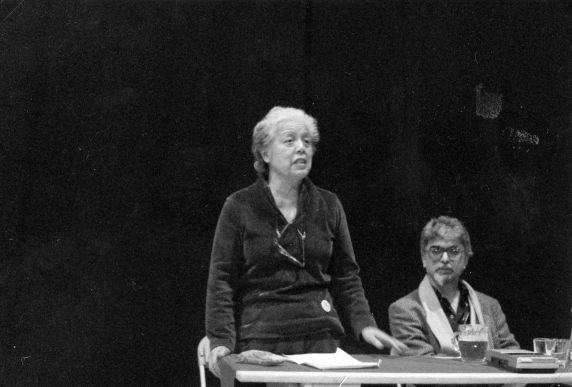In Memoriam: Grace Lee Boggs (1915-2015)
The Reuther Library mourns the passing of our friend, the incomparable Grace Lee Boggs.
Boggs was a writer, philosopher, mentor, and an outspoken activist for many causes, including civil rights, workers’ rights, Black Power, environmental justice, feminism, and community empowerment. To many, she seemed a force of nature – always working, organizing, teaching, and inspiring others to think critically and improve the world around them. Her philosophies evolved constantly throughout her life, but one thing held true from the beginning to the end: her faith that positive social change was possible if people were willing to work together.
Grace Chin Lee was born on June 27, 1915 in Providence, Rhode Island to a family of Chinese immigrants. She excelled at academics, enrolling at Barnard College at age 16 to earn a degree in philosophy and later at Bryn Mawr College to earn her doctorate. Her lifelong commitment to fighting for the rights of the underrepresented – women and people of color – began in Chicago in the early 1940s when she became involved with the movement for tenants rights, the Workers Party, and eventually the Socialist Workers Party. Throughout the 1940s and 1950s, Boggs became heavily involved with Marxism-Leninism, collaborating with C.L.R. James and Raya Dunayevska, among others, in the Johnson-Forest Tendency. She met James (Jimmy) Boggs, a black autoworker and radical activist from Detroit, while working for the Correspondence Publishing Committee. The couple married in 1953 and together would become deeply involved in the Black Power movement and local civil rights activities in Detroit, such as the 1963 “Walk to Freedom.”
The effects of Detroit’s deadly 1967 civil unrest on her community moved Boggs to look away from the philosophies of confrontational revolution and radicalism and towards Martin Luther King, Jr.’s vision of non-violence and community building as the solution for meaningful change. The welfare of Detroit and its residents would be the focus of Boggs’ work for the remainder of her life. She created programs that helped at-risk youth, the elderly, and the unemployed. One of her most influential projects was the creation of “Detroit Summer,” a multicultural, intergenerational youth program that fostered leadership and made improvements within the community by tackling blight, planting community gardens, and painting murals. In 1995, her home became the base for the James and Grace Lee Boggs Center to Nurture Community Leadership, a center devoted to community-based organizing and grassroots social activism on local and national levels.
Boggs believed that true revolution, within the society and within oneself, was not a single event, but rather an ongoing, ever-evolving process fed by discussion, examination, and collaboration. Her political evolution can be traced through various collections in the Reuther Library. The James and Grace Lee Boggs Papers relate largely to publications and speaking engagements reflecting their involvement with radical organizations and in updating radical political theory, as well as their community activism in Detroit. Of particular interest is material relating to their contribution to the founding of the National Organization for an American Revolution (NOAR); the Asian Political Alliance; the Inner City Organizing Committee; and the Michigan Committee for Organizing the Unemployed. In addition to the papers, an oral history interview with Boggs is available for research use.
The Raya Dunayevskaya Papers provide a better understand of Boggs’ relationship with communism and her role in the Johnson-Forest Tendency. The papers include oral history interviews of Boggs and her husband, as well as examples of her early translation work on essays by Karl Marx, including “Alienated Labor,” “Private Property and Communism,” and “Critique of the Hegelian Dialectic.” The papers also include dozens of unpublished letters between Dunayevskaya, C.L.R. James, and Boggs.
Complementary collections to the papers of James and Grace Lee Boggs include the Martin and Jessie Glaberman Papers, a rich resource that helps paint a fuller picture of Boggs’ activities in the 1950s and 1960s. The material includes correspondence with Boggs, radical publications, speeches, and interviews about the Correspondence Publishing Committee/Company, C.L.R. James, and the Socialist Workers Party. The Frances D. and G. Lyman Paine Papers contain correspondence with Boggs, as well as material concerning the Johnson-Forest Tendency and the Correspondence Publishing Company. The Lily Lampinen Papers focus on important social and political issues of the 1960s, particularly civil rights for minorities. Copies of Correspondence, the newspaper published by the Correspondence Publishing Committee, are available for use in our reading room. Boggs and her husband were instrumental in the development of the publication, which focused on examining political issues of concern to African Americans, women, and rank and file workers.


 Reddit
Reddit Facebook
Facebook LinkedIn
LinkedIn